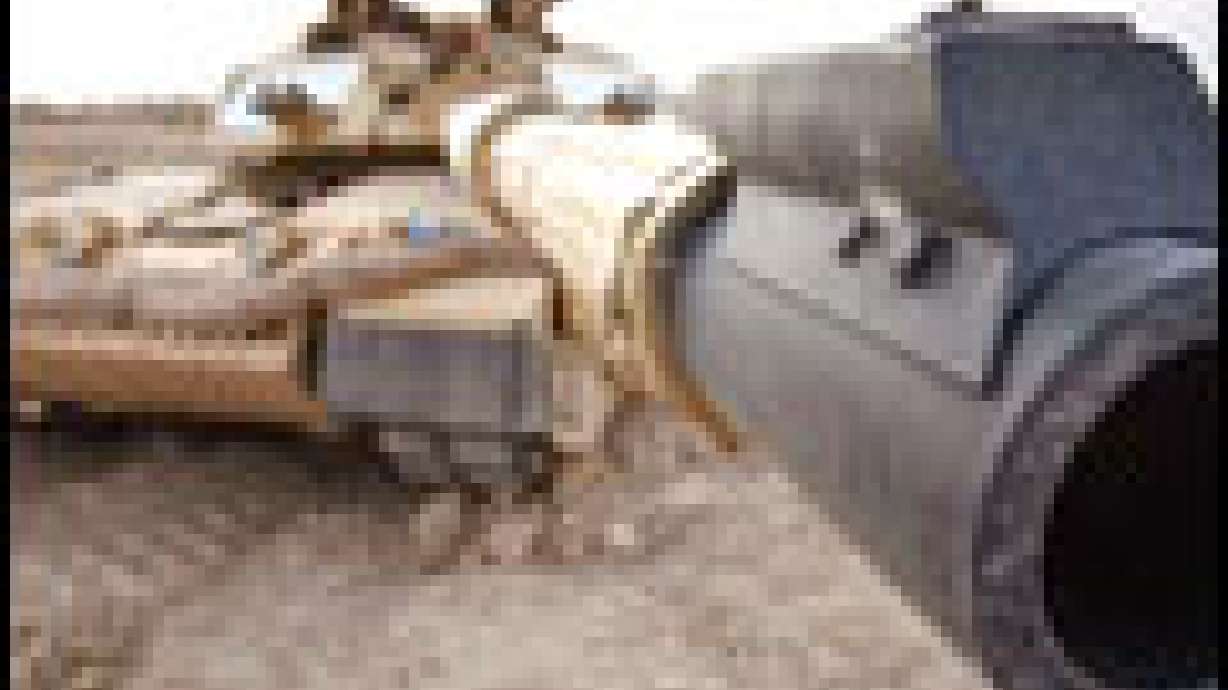Estimated read time: 5-6 minutes
This archived news story is available only for your personal, non-commercial use. Information in the story may be outdated or superseded by additional information. Reading or replaying the story in its archived form does not constitute a republication of the story.
(AP) American troops took the northern city of Mosul without a fight and awaited surrender from holdout forces in western Iraq on Friday, dismantling the remnants of Saddam Hussein's regime. U.S. commanders vowed to stem looting in Baghdad and other areas.
In a war nearly won, President Bush said he didn't know whether the Iraqi ruler was alive or dead. "I know he's no longer in power," Bush added.
Mosul, Iraq's third largest city, fell when an entire Army Corps evaporated, a force of roughly 30,000 on paper but far less in reality. That left Tikrit, Saddam's hometown, as the biggest population center not under the control of American-led forces.
Warplanes bombed Iraqi forces in the area, and U.S. commanders were planning for stiff resistance as they mapped plans for battle in the next several days.
Gen. Richard Myers, chairman of the Joint Chiefs of Staff, said he expected fighting to end soon in Qaim, a town near Iraq's western border with Syria. "There have been intelligence reports that the leaders ... want to surrender. And so, I think that's going to be worked out today, tomorrow," he said.
Looting swiftly erupted in Mosul -- hospital ambulances were taken at gunpoint -- and lawlessness continued to plague Baghdad and Kirkuk, cities that fell in the past few days.
Defense Secretary Donald H. Rumsfeld described the lawlessness as "untidiness," but pledged the troops' help to stop it. "Where they see looting, they are stopping it," he said.
Across Iraq, there were scenes of personal anguish, mixed with moments of hope.
Men, women and children lay in hospitals without adequate medical supplies, and Baghdad residents worked frantically to find missing relatives in a rumored subterranean prison.
But thousands of former Iraqi soldiers walked from northern cities toward Baghdad down sun-baked highways after abandoning their military positions, eager to return home after being forced by the dead regime to take up arms.
Bush, visiting troops wounded in battle, told reporters the war would end when Gen. Tommy Franks, the commanding general, told him the objectives had been achieved.
Saddam and his sons are "either dead or they're running like hell," said Franks, top commander of a war nearly won.
The U.S. Central Command issued a deck of 55 cards, each one bearing the picture of a member of the ruling elite so the troops could better know who they were searching for. "There are jokers in this deck," Brig. Gen. Vincent Brooks said, and Saddam was the ace of spades.
Apart from Saddam, there were no signs of weapons of mass destruction, or of missing American prisoners of war. Officials said the search for both would intensify.
Despite a string of unchecked battlefield gains, and an announcement that some British naval and air forces were being sent home, the White House and military commanders said the war wasn't over.
"There's still plenty of fighting to be done," said Lt. Gen. William S. Wallace. In Baghdad, he said, the problem lies with the "knuckleheads ... operating and fighting on the last orders they were given. They either don't know what is going on or are feeling obligated to keep fighting on."
U.S. warplanes fired six satellite-guided bombs at an intelligence building in Ramadi, 60 miles west of Baghdad, in a predawn attack. Officials said they believed Brazan Ibrahim al-Tikriti, Saddam's half brother and close adviser, was inside.
To the west, U.S. special operations forces maintained roadblocks along border crossings to Syria, under orders to prevent regime members from fleeing Iraq.
In the capital, where four Marines were wounded in a suicide attack on Thursday, one Marine opened fire on a car that failed to stop at a checkpoint. AP Broadcast News reporter Ross Simpson said three adults were killed, including the parents of a 5-year-old girl who was wounded.
In Nasiriyah, two children were killed and nine adults injured when Marines fired on another van that refused to stop.
There was no accurate count of the number of troops in the Iraqi Army's 5th Corps in Mosul, the third largest city with a large Arab population as well as Kurds and ethnic Turks.
Mosul was the second northern city to fall in as many days. U.S. troops and Kurdish fighters entered Kirkuk, gateway to the northern oil fields on Thursday. The Kurds said they were prepared to leave, in deference to Turkish concerns, when Americans arrived in numbers.
Top commanders of the 1st Marine Division held the first of what is expected to be a series of daily meetings with representatives of humanitarian organizations and local officials. The session was part of an effort to restore the city's utilities, services and infrastructure, damaged by war and the subsequent lawlessness.
"We know they need water. Obviously they need power. They need police," said Col. Steve Hummer, commanding officer of the Marine division. "But we are not a police force," he added, a declaration seconded by Brooks at the U.S. Central Command.
Franks, the four-star general in charge of the military campaign, spoke pungently on a visit to Afghanistan, where U.S. troops have been stationed since the military routed the Taliban government last year. Asked about the fate of Saddam and his sons, he replied, "They're either dead or they're running like hell. That is the case with the leadership of the regime inside Iraq."
(Copyright 2003 by The Associated Press. All Rights Reserved.)








